World Seagrass Conference 2022, Annapolis Maryland
Emma A. Ward
Institute of Marine Sciences, School of Biological Sciences, University of Portsmouth
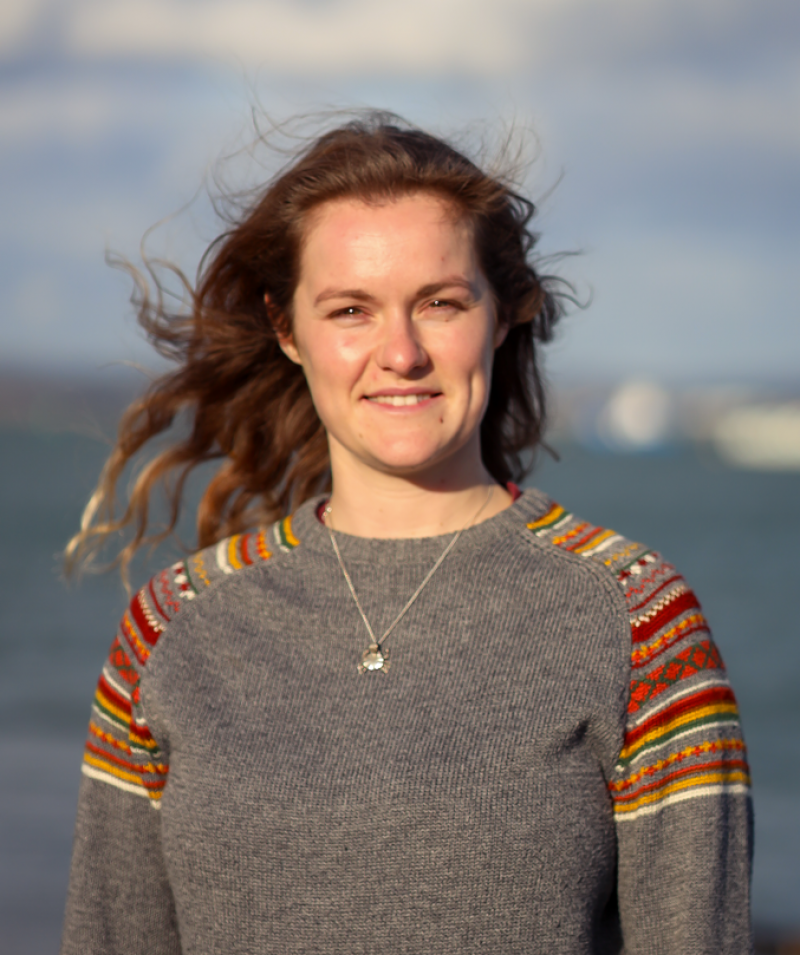
Thanks to a Challenger Society Student Travel award I was able to attend the 2022 World Seagrass Conference and 14th international seagrass biology workshop this year (7-12th August) in Annapolis, Maryland, USA, with Chesapeake Bay as a fitting backdrop. This was this first time during my PhD that I have been able to attend and present at a conference in person! Given I was presenting the meta-analysis that I completed when working from home during the second UK covid-19 lockdown, it felt even more poignant that we were all able to meet in person to share our research success from the last two years. In fact, during day one I was able to utilise the event to foster some in-person connections, as I was finally able to meet face-to-face with two of my co-authors from an international collaboration on the range expansion of Marinomyxa marina, a phytomyxid parasite found within the seagrass Halophila stipulacea (doi.org/10.1016/j.aquabot.2022.103554). Which is a collaboration that began during my master’s research when I was based at the University of Essex.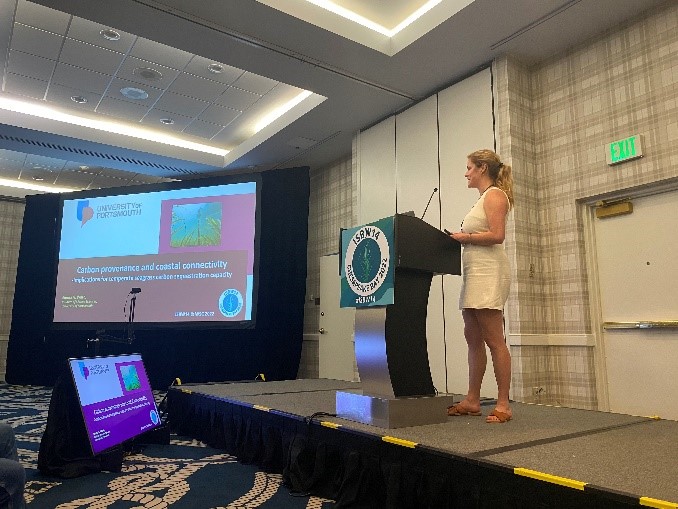
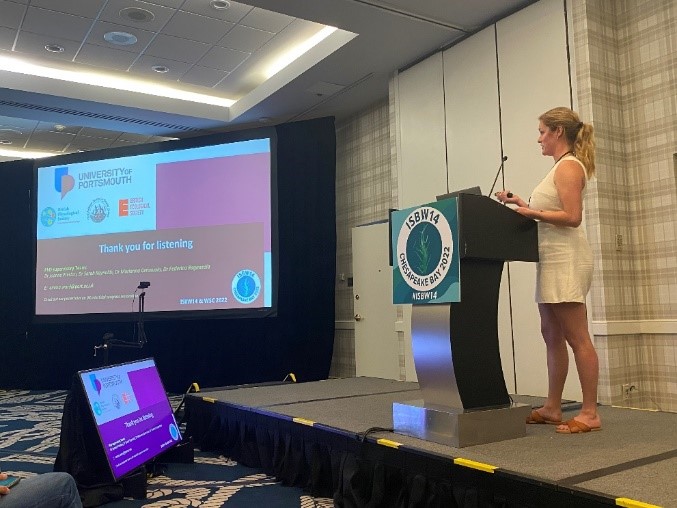
Figure 1. Presenting my talk on carbon provenance and coastal connectivity at WSC2022 and ISBW14.
Day two provided me the opportunity to showcase the current research I am working on; firstly, presenting my meta-analysis on coastal connectivity and carbon provenance in the carbon ecosystem services session; secondly, presenting in the poster session some of the active intertidal seagrass restoration work we have been undertaking at the University of Portsmouth with our partners and collaborators (The Hampshire and Isle of Wight Wildlife Trust; Boskalis Westminster and Wightlink ferries). My meta-analysis collates an updated global synthesis of δ13C analyses from seagrass sediments and leaves, enabling its categorisation into seagrass bioregions alongside grouping by seagrass species size. This updated global database demonstrates that a meadow’s seagrass species composition and placement within the seascape influences its carbon sequestration capacity. The seagrass restoration poster also focused on ecosystem services provision, but instead those potentially supported by restored intertidal seagrass (Zostera noltei) in the UK.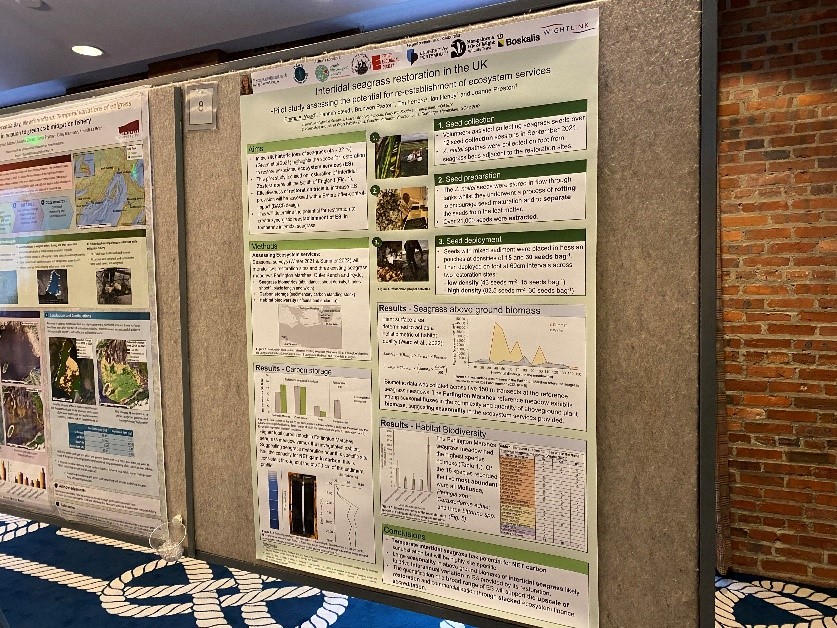
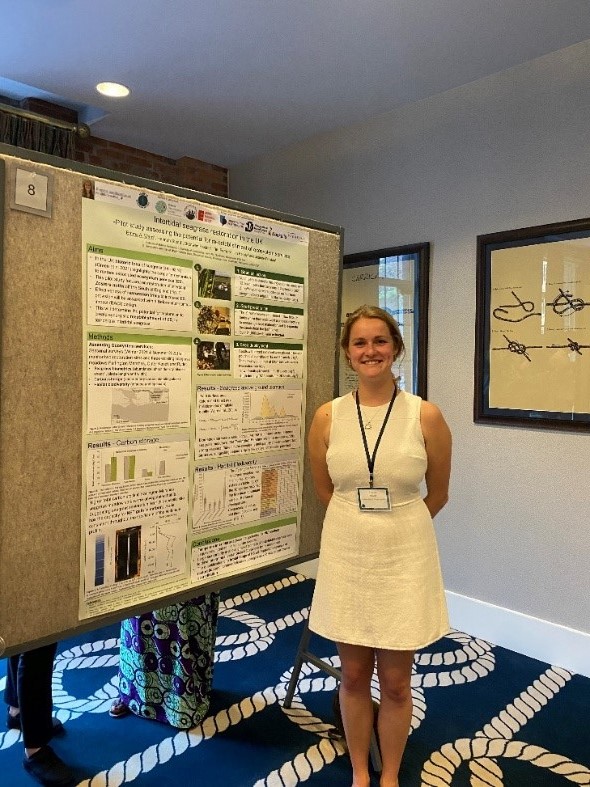
Figure 2. Tuesday evening’s Poster session showcasing our UK intertidal seagrass restoration. Project partners; University of Portsmouth, The Hampshire and Isle of Wight Wildlife Trust; Boskalis Westminster and Wightlink ferries.
The week was completed with; a field trip out onto Chesapeake Bay to explore the seagrass via boat and snorkelling; and with some engaging workshops. I really hope I will be able to join the next World Seagrass Meeting (ISBW15) in 2024, as the conference is certainly one, I would recommend. I again what to take to the time express how I really appreciate the support I received from the Challengers Society, this made my attendance possible and without whom I would not have had the fantastic opportunity to present at this international conference.
Who am I?
I am a second year PhD student at the University of Portsmouth studying the carbon sequestration capacity of seagrass in the UK. Prior to starting the PhD I was simultaneously a Marine Conservation supervisor at Archipelagos Institute of Marine conservation and a Masters research student at the University of Essex. I also undertook my undergraduate degree at the University of Essex where I found my particular interest for seagrass research having the opportunity to explore the seagrass beds of Greece, Tanzania and Indonesia.
Latest News
Royal Society Publishing Photography Competition 2025
Please see a message from the Royal Society below:
We are delighted to announce that the 2025 Competition is now open for entries until 15 August for a chance to win £1000! The competition celebrates the power of photography in conveying the wonder of science happening all around us and photographs can be submitted in the categories of: Astronomy, Behaviour, Earth Science and Climatology, Ecology and Environmental Science, and Microimaging.
The competition is free to enter and open to anyone studying or working in science at graduate level or above. Category winners will receive a one-year membership to the Royal Photographic Society and the overall winner will receive a grand prize of £1,000. Find out more: https://bit.ly/RSPphotocomp
October 2025 MEDIN Workshop: Marine Data Management, Governance and the MEDIN toolset
The Marine Environmental Data and Information Network (MEDIN) are pleased to announce that registration is now open for the next occurrence of our popular free online training workshop: ‘Marine Data Management, Governance and the MEDIN toolset’ on the 13th – 17th October 2025 on OceanTeacher Global Academy.
Marine Data Management, Governance and the MEDIN toolset
The Marine Environmental Data and Information Network (MEDIN) and OceanWise are delighted to invite you to attend our popular free online training workshop: ‘Marine Data Management, Governance and the MEDIN toolset’ on the 19th – 23rd of May 2025.
